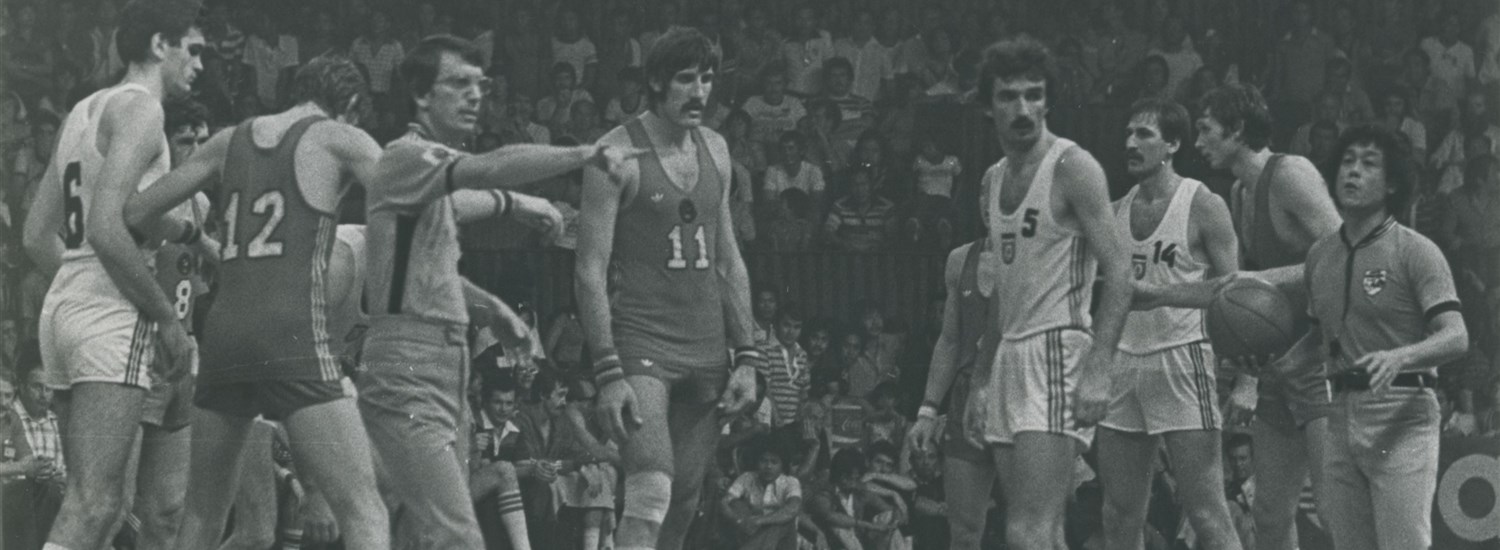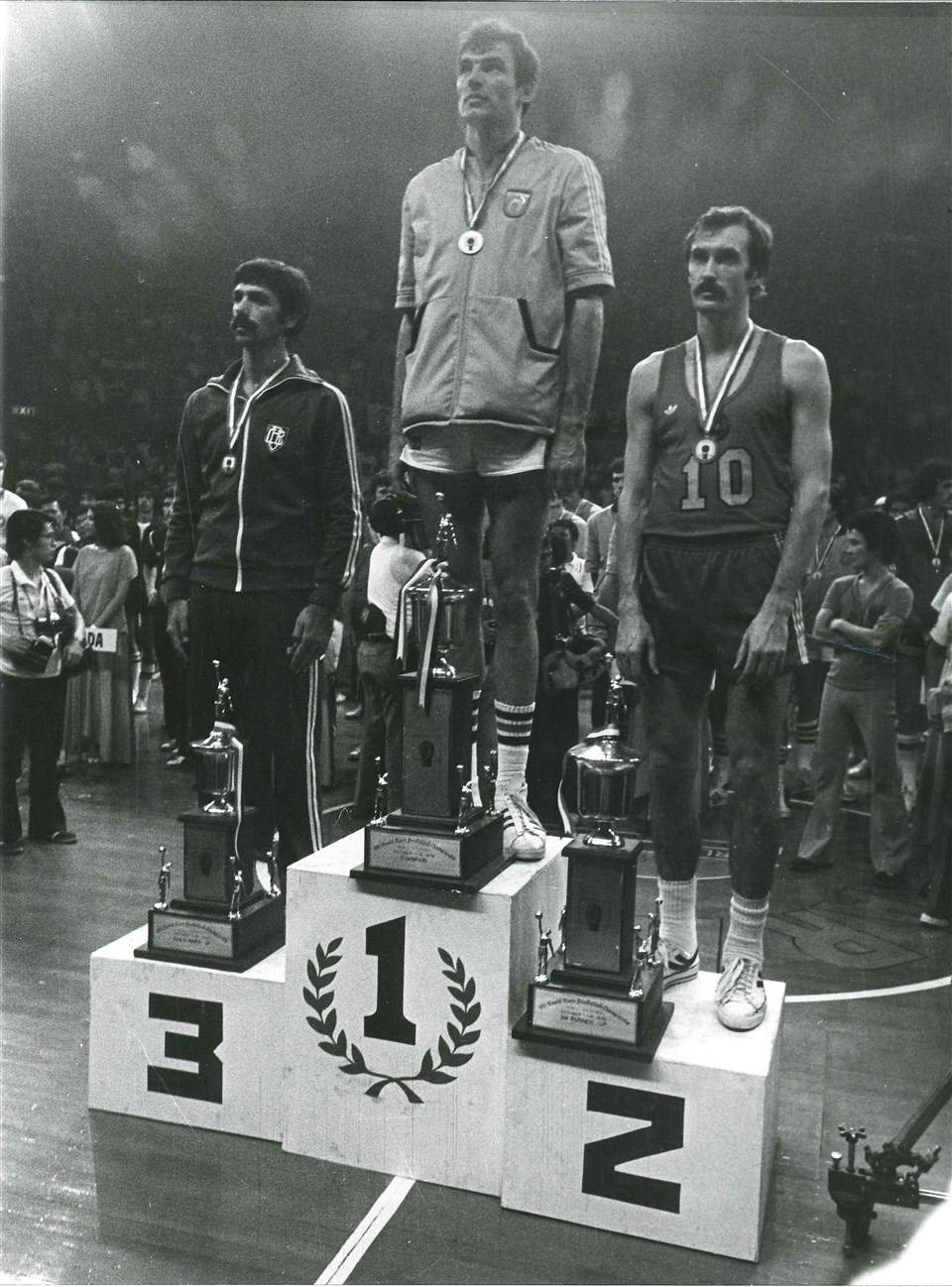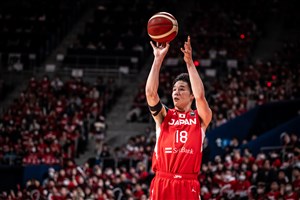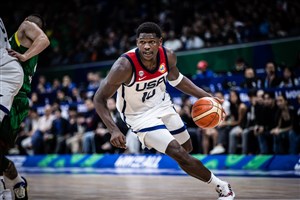
The Best of 1978 World Cup: Yugoslavia win second world title after OT thriller
MIES (Switzerland) - Asia hosted the FIBA Basketball World Cup for the first time in 1978 with the globe's best converging on the Philippines. Yugoslavia became the third country to win two world titles while reigning champions Soviet Union finished second and Brazil took third place.
The premier in Asia also saw a format change as the eighth World Cup was the first with an official Final instead of a Final Round group stage to decide the world champion. Yugoslavia ended up beating Soviet Union 82-81 in overtime to take the championship. Brazil downed Italy 86-85 at the buzzer for third place.
The best team: Yugoslavia
| Rank | Team | W-L |
| 1. | Yugoslavia | 10-0 |
| 2. | Soviet Union | 6-2 |
| 3. | Brazil | 8-2 |
| 4. | Italy | 6-4 |
| 5. | USA | 6-4 |
| 6. | Canada | 4-6 |
| 7. | Australia | 4-6 |
| 8. | Philippines | 0-8 |
| 9. | Czechoslovakia | 5-2 |
| 10. | Puerto Rico | 4-3 |
| 11. | China | 2-5 |
| 12. | Dominican Republic | 2-5 |
| 13. | Korea | 1-6 |
| 14. | Senegal | 1-6 |
The 1978 World Cup, known at the moment as FIBA World Championship, was the first to take place in Asia with FIBA hosting the competition in the Philippines and the games being played in Manila and Quezon City from October 1-14.
For the second consecutive World Cup, 14 teams participated: hosts Philippines; holders Soviet Union; the top three qualified from FIBA EuroBasket 1977: Yugoslavia, Czechoslovakia and Italy; the top two from CentroBasket: Dominican Republic and Puerto Rico; the top two from FIBA AsiaCup: China and Korea; the South American winners Brazil; African champions Senegal; Oceania winners Australia; and the North America invitees USA and Canada.

Once again, the hosts and reigning champions were given a bye for the Preliminary Round, which saw the other 12 teams broken down into three groups of four for round robin play. The top two from each group joined Philippines and Soviet Union in the Semi-Final Round after which there would be placement games - meaning a final for first place as well as a third place game, instead of deciding the champion solely by group standings as in previous World Cups.
Three-time reigning EuroBasket champions Yugoslavia, Brazil and USA prevailed in their respective groups with Canada, Italy and Australia joining them in the Semi-Final Round. Brazil's 154-97 victory over China in Group B set two new records. The South Americans scored the most points in a World Cup game, topping the Soviet Union's mark in a 140-48 win over Central African Republic in 1974. The 251 combined points were also a new high, eclipsing the 231 in Czechoslovakia's 119-112 win against Philppines in 1974.
The Semi-Final Round had a mild early surprise as Italy defeated USA 81-80 on the first day. The Americans lost to Yugoslavia 100-93 on the third day and 92-90 to Brazil on day 5. That same day also saw Yugoslavia defeat Soviet Union 105-92.
Yugoslavia fought off Brazil 91-87 on day 6 and Soviet Union beat the South Americans on the final Semi-Final Round day to lock up second place in the group and set up a Final showdown with Yugoslavia.
Brazil and Italy finished third and fourth, respectively in the group and faced off again in the third place game. The drama was high as Marcel de Souza won the game with a buzzer beater from eight meters in an 86-85 win over Italy for their sixth podium finish in eight tournaments. De Souza led the way with 22 points and Oscar Schmidt scored 18 points for the Brazilians while Gianni Bertolotti and Renzo Bariviera both had 21 points.
That left the first ever official Final in the World Cup history between Yugoslavia and Soviet Union. The game was tight throughout and ended up going to overtime, where Yugoslavia proved too strong in an 82-81 win. Drazen Dalipagic had 21 points and Dragan Kicanovic scored 17 points for the champions with Vladimir Tkachenko pacing five Soviets in double figures with 14 points.
 Helio Rubens Garcia of Brazil, Kresimir Cosic of Yugoslavia and Sergej Belov of Soviet Union
Helio Rubens Garcia of Brazil, Kresimir Cosic of Yugoslavia and Sergej Belov of Soviet Union
The best player: Drazen Dalipagic MVP
After three consecutive World Cups of it not being the case, the Most Valuable Player award finally went to a player from the world champions again with Drazen Dalipagic of Yugoslavia taking the trophy. Dalipagic led Yugoslavia in scoring with 22.4 points.
He started the tournament with just 5 points in a blowout of Senegal and slowly got going after that with 13 and 18 points against Korea and Canada respectively in the Preliminary Round. Dalipagic tipped off the Semi-Final Round in style with 31 points against Philippines and followed that with 29 points against Italy and 28 versus USA.
He stepped up again in the showdown with Soviet Union with 37 points before picking up 20 points against Brazil. Yugoslavia head coach Aleksander Nikolic sat his stars for the meaningless final Semi-Final Round game against Australia and Dalipagic was ready for the Final with a team-high 21 points - including the game-deciding free throw - in an 82-81 win over Soviet Union.
Dalipagic was joined on the All-Tournament Team by teammates Kresimir Cosic and Dragan Kicankovic, Vladimir Tkachenko of runners-up Soviet Union and Oscar Schmidt from third placed Brazil.
The best game : The Final between Yugoslavia and Soviet Union
The two powers in European basketball were to battle for world supremacy - with either Yugoslavia to join Brazil and Soviet Union as two-time world champs or the Soviets to become the first three-time winner. The two countries battled in the Semi-Final Round and Yugoslavia won 105-92 thanks to Drazen Dalipagic scoring 37 points and Dragan Kicanovic pouring in 34 points.
The Final proved to be a tightrope act. Yugoslavia briefly opened an 11-point lead 31-20 in the first half but Soviet Union charged back and knotted the game 39-39 and it was 41-41 at halftime. Yugoslavia were up 49-45 when the Soviets mounted an 8-0 spurt to go ahead for the first time and lead 53-49.
Yugoslavia tied the game 59-59 and neither team pulled away by more than 4 points the rest of regulation with Anatolij Myshkin scoring with 27 seconds left to make it 73-73 and force overtime.
Soviet star center Vladimir Tkachenko fouled out on the tipoff to start the extra session. With the score 77-77, Yugoslavia finally opened up some breathing room with five straight points - Dalipagic's free throw for an 82-77 lead with 78 seconds to play. That ended up being the winning point as Sergej Belov could only make it 82-81 with his score with 6 seconds on the clock. Yugoslavia would kill the clock and celebrate once again.
The best story: Oscar Schmidt debuts on world stage
The 1978 World Cup saw the debut of one of the globe's biggest future stars - Oscar Schmidt of Brazil. And the future Hall of Fame scoring machine did not disappoint.
Despite turning 20 years old just eight months earlier, Schmidt showed more than a glimpse of what he can do. He tallied 21 points in his first game against China, following that with 23 and 20 points against Italy and Puerto Rico, respectively to help Brazil into the Semi-Final Round.
 Oscar Schmidt (holding the ball) played his first World Cup in 1978
Oscar Schmidt (holding the ball) played his first World Cup in 1978
Schmidt then had 19 points versus Canada and 14 against Australia before lighting up Philippines for 27 points. Schmidt was held scoreless by USA before breaking out for his best output of the tournament - 31 points in a thrilling 91-87 loss to eventual champions Yugoslavia.
The last Semi-Final Round game saw Schmidt score 19 points against Soviet Union and then the young legend-to-be tallied 18 points in helping Brazil return to the podium in an 86-85 thriller over Italy in the third place game. Schmidt would go on to play in three more World Cups and five Olympic Games.
The best performance: Kamil Brabenec
Kamil Brabenec of Czechoslovakia led the competition in scoring average with 26.9 points in seven games. He started the tournament with 11 points against Australia and then scored 27 against USA before finishing with 14 points in a win over Dominican Republic.
Brabenec was unstoppable in the first two games of the Classification 9-14, torching Puerto Rico for 44 points to set a new World Cup single game scoring record, topping the 42 points Ricardo Duarte of Peru scored against Japan in 1963 and Arturo Guerrero tallied versus Central African Republic in 1974.
Brabenec, who scored 41 points in a game against Argentina at the 1974 World Cup en route to averaging 17.7 points, hit 41 points again the game after setting the scoring record - this time against China. He finished with 26 and 25 points versus Korea and Senegal respectively.
Stats leaders
Scorers
| Player (country) | Points Per Game |
| Kamil Brabenec (Czechoslovakia) | 26.9 |
| Wei Ping Chang (China) | 25.3 |
| Drazen Dalipagic (Yugoslavia) | 22.4 |
| Bum-Yung Choi (Korea) | 21.1 |
| Leo Rautins (Canada) | 19.7 |
| Oscar Schmidt (Brazil) | 19.2 |
| Marcel de Souza (Brazil) | 18.9 |
| Ruben Rodriguez (Puerto Rico) | 18.1 |
| Ivan Mieses (Dominican Republic) | 18.1 |
| Dragan Kicanovic (Yugoslavia) | 18.0 |
FIBA
















_d088e077-15a0-448f-b143-4b4d97c09bc7.png)




























